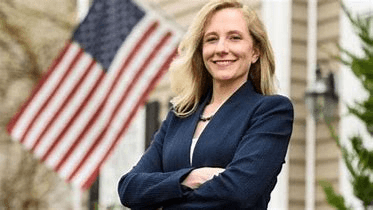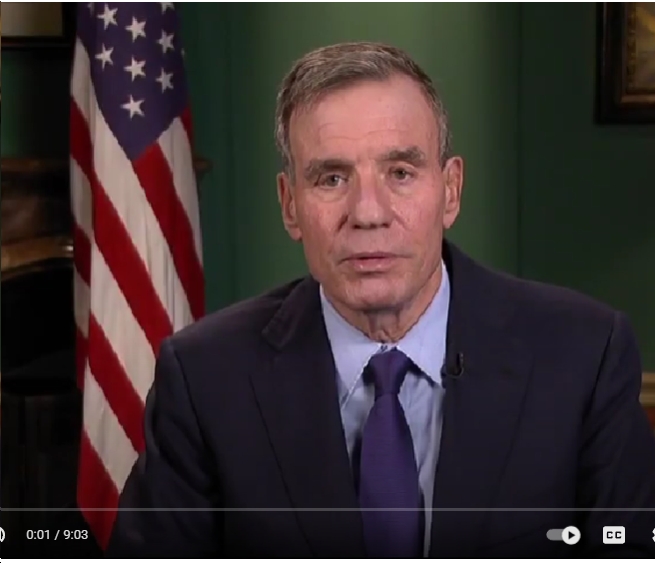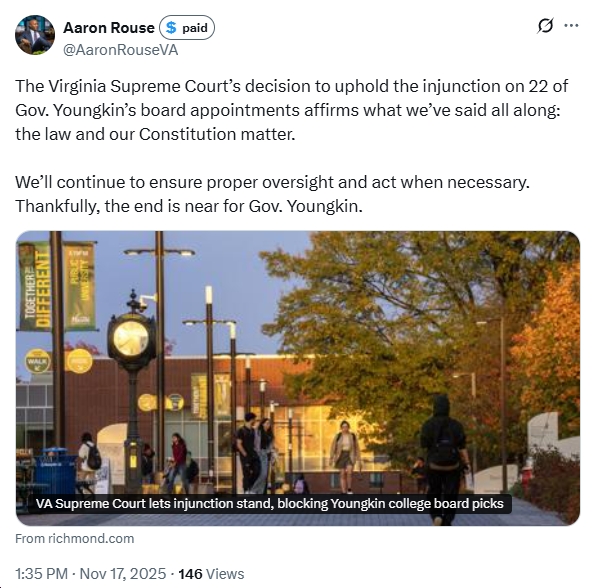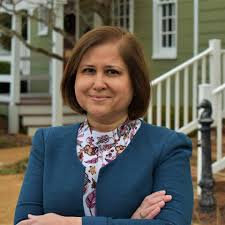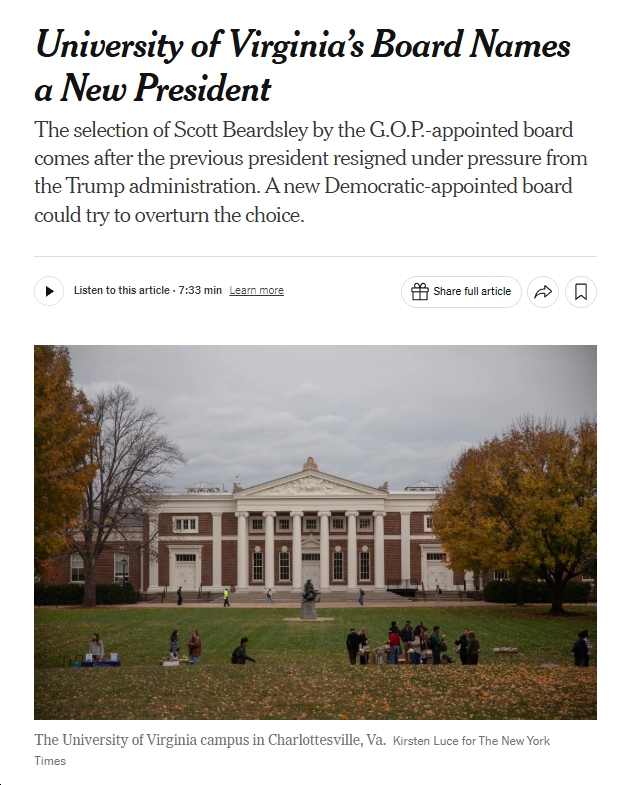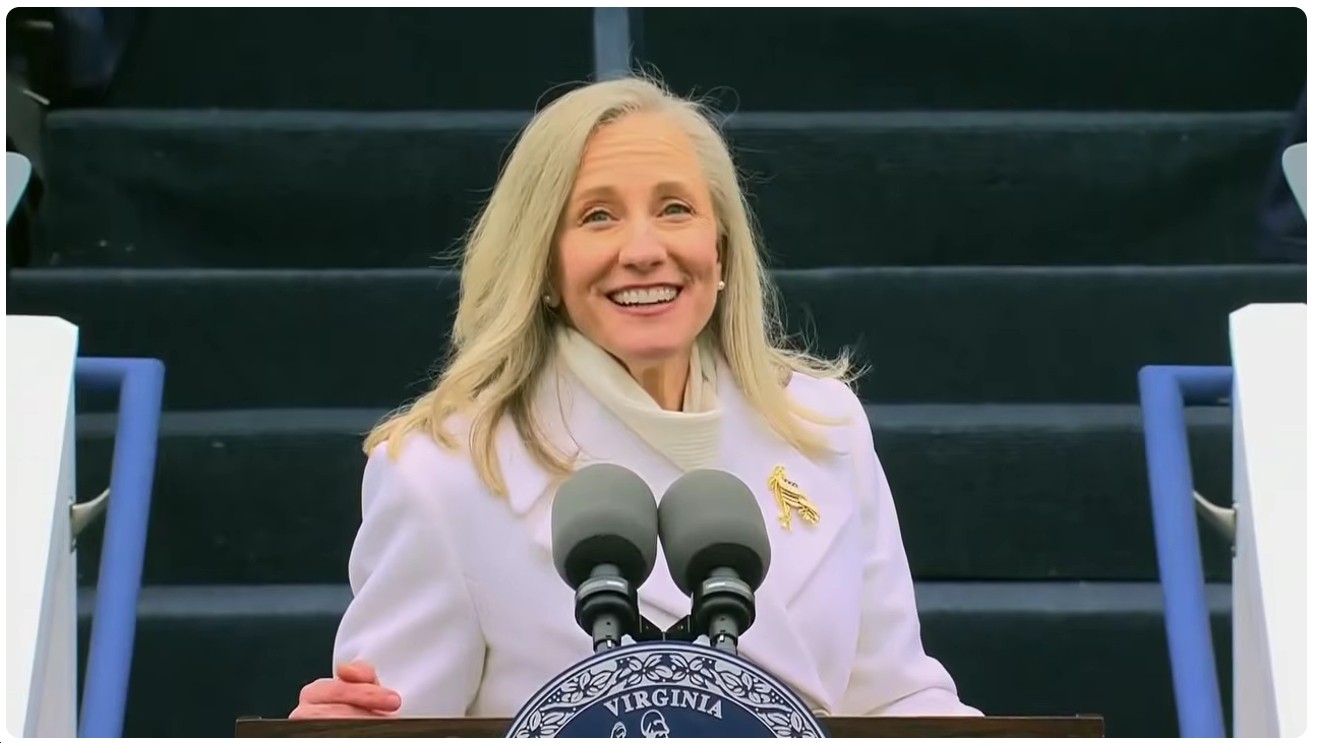A few minutes ago, the Virginia Senate Privileges & Elections Committee voted 8-4 to reject Gov. Glenn Youngkin’s nominations of several individuals to Virginia college/university Boards of Visitors. Among those rejected this afternoon was former VA Attorney General and former Trump Administration official Ken Cuccinelli, who is about as far-right-exremist as you can get in this country, and who obviously is utterly unsuited to serve on the University of Virginia Board of Visitors.
Anyway, with that, see below for video, as well as a statement by State Senator Ghazala Hashmi commending the rejections of these egregious nominations, and – on a related note – VA Senate Majority Leader Scott Surovell’s “letter to the Rectors of the Board of Visitors for every public university in Virginia and the Virginia Community College system, emphasizing the General Assembly’s constitutional authority over public higher education institutions and the importance of independent governance…following the General Assembly’s decision to refuse confirmation of eight individuals nominated by Governor Glenn Youngkin to the Boards of Visitors of the University of Virginia, Virginia Military Institute, and George Mason University.” (see here for the eight individuals)
UPDATE 5:51 pm – Also, see Senate P&E Committee Chair Aaron Rouse’s statement, below.
Majority Leader Scott Surovell Issues Letter to University Rectors Emphasizing Legislative Authority and Independent Governance
Richmond, VA – Senate Majority Leader Scott A. Surovell today issued a comprehensive letter to the Rectors of the Board of Visitors for every public university in Virginia and the Virginia Community College system, emphasizing the General Assembly’s constitutional authority over public higher education institutions and the importance of independent governance.
The letter comes following the General Assembly’s decision to refuse confirmation of eight individuals nominated by Governor Glenn Youngkin to the Boards of Visitors of the University of Virginia, Virginia Military Institute, and George Mason University.
“Virginia is proud to maintain one of the strongest public higher education systems in America,” the letter states. “Our Commonwealth is home to some of the nation’s oldest and most prestigious institutions, and they deserve governance that is independent, principled, and focused solely on their academic mission and service to the Commonwealth.”
Key Points Emphasized in the Letter:
Legislative Authority: The letter cites Virginia Code § 23.1-2200, which establishes that public university boards “shall at all times be under the control of the General Assembly,” clarifying the ultimate authority over these taxpayer-funded institutions.
Executive Branch Limitations: Surovell clarified that the Governor does not possess authority to issue binding directives to Boards of Visitors regarding university operations, policies, or governance decisions, noting that “Executive Orders do not carry the force of law.”
Independent Fiduciary Duty: Rectors and Board members are reminded of their responsibility to exercise independent judgment in all matters affecting their institutions, including academic programs, faculty decisions, student policies, and strategic planning.
Accountability Standards: The General Assembly expects Board members to make decisions “based on sound judgment, institutional needs, and the broader public interest rather than external political pressures.”
The letter emphasizes that Virginia currently operates under divided government, meaning university governance is “a shared exercise between coequal branches of government.”
“The General Assembly takes seriously its oversight responsibilities regarding Virginia’s public universities,” Surovell wrote. “Should any Board of Visitors fail to exercise appropriate independent judgment or allow external influences to compromise their fiduciary duties, the General Assembly will not hesitate to examine the situation and take whatever legislative action may be necessary.”
Surovell also reminded recipients that Virginia Code § 23.1-1300 requires all Board of Visitors members to be confirmed by the General Assembly, stating they “will not confirm individuals who do not possess the judgment, character, or willingness to follow the principles articulated in this letter.”
Virginia’s public higher education system serves hundreds of thousands of students and includes historic institutions such as the University of Virginia (founded 1819), the College of William & Mary (founded 1693), and Longwood University (founded 1839), among others.
The General Assembly is currently in special session with jurisdiction to consider confirmation or rejection of nominees through the end of the year and the 2026 Regular Session.
####
Senator Scott A. Surovell represents the 34th Senate District encompassing Southeastern Fairfax County. Prior to his time in the Senate, Surovell served six years in the House of Delegates. Surovell lives in Mt. Vernon. He practices law and has dedicated his legislative career to fighting for Northern Virginia’s fair share, protecting consumers, and preserving our environment for future generations.
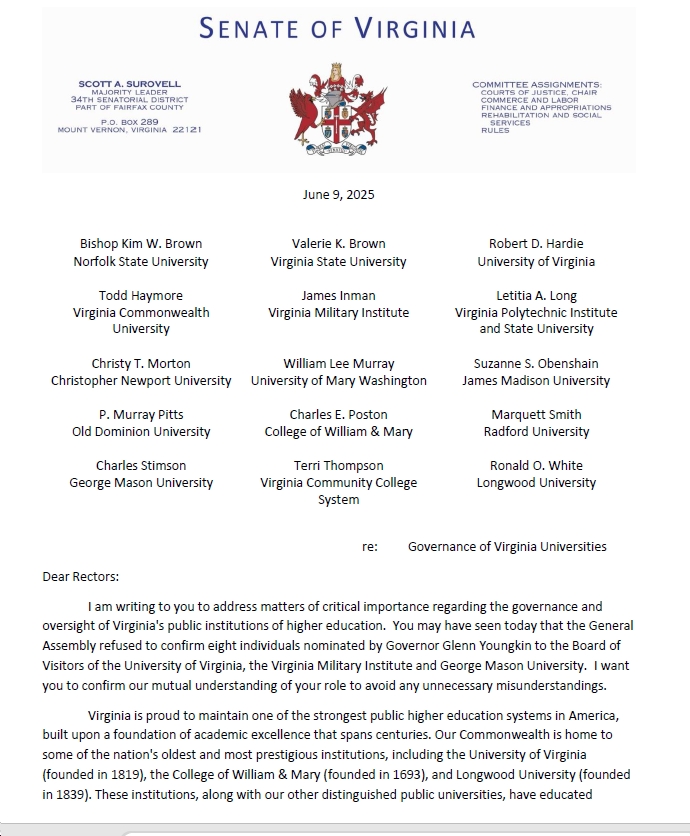
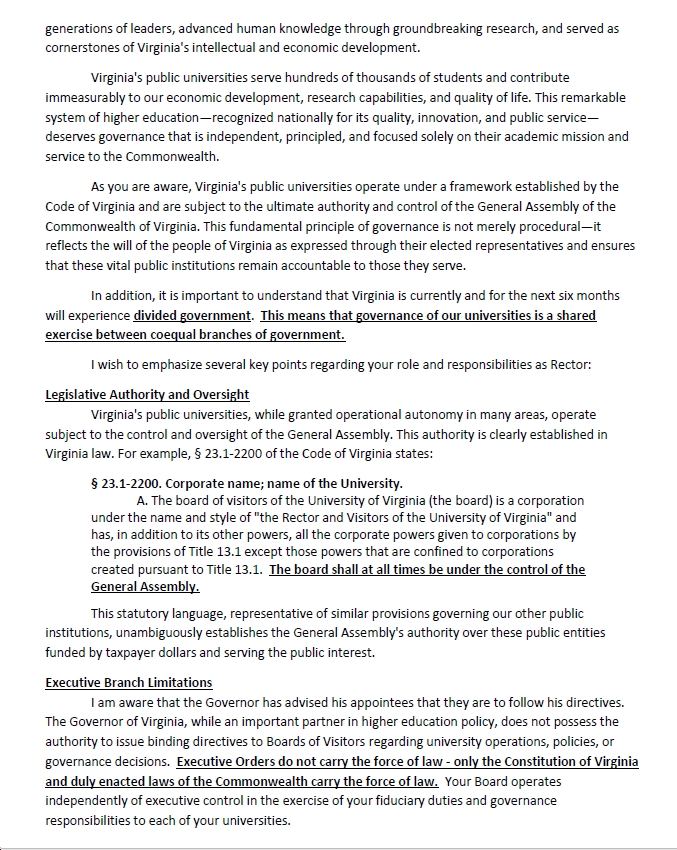
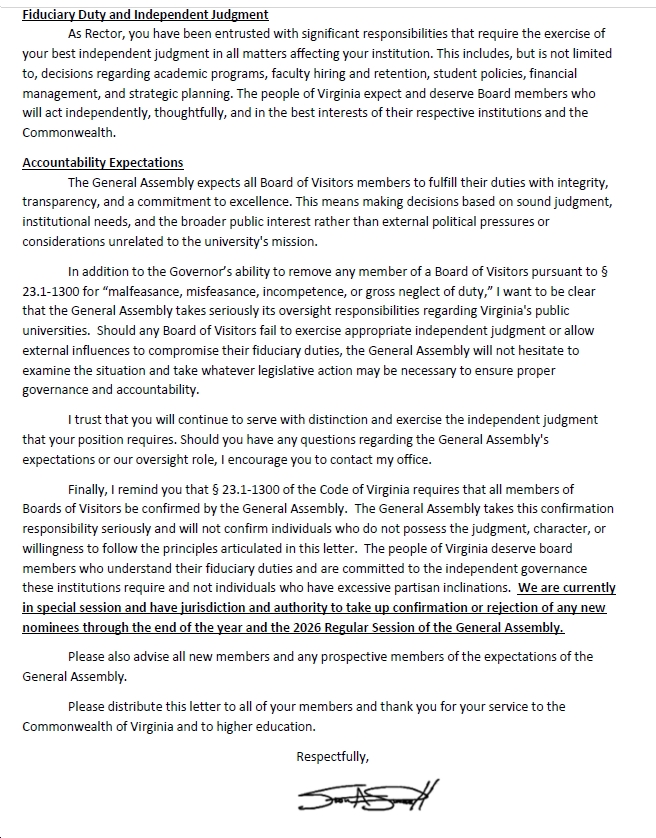
Senator Hashmi, Chair of the Senate Education and Health Committee, Commends the Rejection of Youngkin Appointees to Boards of Visitors
Richmond — Today, Senator Ghazala Hashmi (D–Richmond), Chair of the Virginia Senate Education and Health Committee, issued the following statement in response to the Senate Privileges and Elections Committee’s rejection of several individuals named by Governor Glenn Youngkin in his latest round of appointments to the Boards of Visitors that oversee Virginia’s public colleges and universities:
“Governor Youngkin’s recent appointments to our institutions’ governing boards are deeply troubling and signal a disturbing pattern of political interference in Virginia’s system of higher education. These decisions do not reflect a commitment to academic excellence, student success, or institutional independence. Instead, they reflect a desire to reshape our public universities according to a narrow ideological agenda that undermines the foundational values of inquiry, inclusion, and integrity.”
Over the past few years, Governor Youngkin has replaced highly qualified and experienced board members with individuals whose chief credentials appear to be ideological alignment and partisan loyalty. Many of the new appointees have expressed open hostility toward the initiatives and programs that support student learning and faculty and staff engagement; additionally, several have questioned the value of academic freedom and shared governance — core principles that define and sustain world-class universities.
“Our Boards of Visitors should reflect the diversity, expertise, and civic responsibility that Virginia’s students and communities deserve,” Senator Hashmi continued. “Instead, we are witnessing a coordinated attempt to erode that diversity, silence critical perspectives, and insert politics into the classroom. These actions are not only reckless — they are profoundly disrespectful to the thousands of faculty, staff, and students who make our institutions thrive.”
Virginia’s public colleges and universities are economic engines and pillars of opportunity. They have historically attracted global talent, led groundbreaking research, and fostered civic leadership. Recent actions by the Governor threaten that legacy.
Senator Hashmi commends the work of Senate Democrats to protect institutional integrity and proposes to consider structural reforms to ensure that future appointments are made with transparency, accountability, and a clear focus on educational excellence.
“This is not about party lines — it is about preserving Virginia’s hard-earned reputation for academic rigor, public service, and inclusive opportunity. As Chair of the Senate Education and Health Committee, I will continue to fight for policies and appointments that serve our students and the broader campus community, not political ambition.”
###
Senator Ghazala Hashmi represents Senate District 15 (parts of the City of Richmond and Chesterfield County) in the Virginia Senate. She serves as Chair of the Senate Education and Health Committee.
|
|

